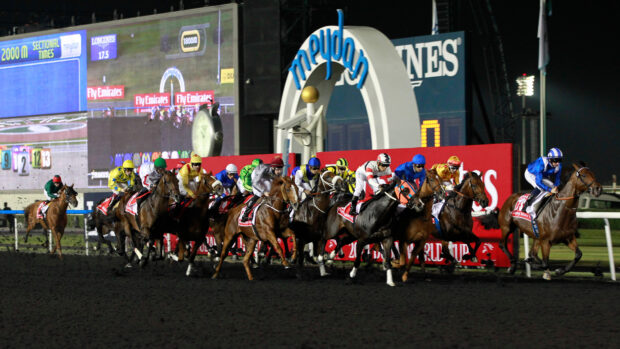Naming a racehorse can be a fun, but also a slightly daunting, task. Here we explain how the British system works and provide examples of some of the names that won’t make it through the system, as well as covering how some of the biggest owners in racing decide on and secure their horses’ names…
Naming a racehorse
In order for a horse to be eligible to race under Rules or in point-to-points they must be registered with a unique name, which will remain with them for life. This is to distinguish each horse from others in a race and allows bloodlines and pedigrees to be more easily traced.
 Watch the video
Watch the videoYou also need to name your horse if you want to breed from them as either a broodmare or stallion or if you want to register any progeny with Weatherbys, which is the organisation responsible for processing racehorse names.
How long does it take to name a horse?
Most applications are processed and completed by Weatherbys within one working day.

Fifty Shades Of Hay | Amazon
David Ashforth has picked out a selection of racehorse names to baffle, surprise and amuse in equal measure.
What are the rules for naming a racehorse?
There are a number of rules surrounding the naming of racehorses that must be adhered to in order to make a successful naming application for a horse:
- Names can have a maximum of 18 characters including spaces and punctuation.
- Initials are not permitted.
- Names may not end with “filly”, “colt”, “stud”, “mare”, “stallion” or any similar horse-related terms.
- Names may not consist only of numbers, unless the number are above thirty and you spell it out. So, you could name a horse “Forty forty”, for example.
- Names must not end with a numerical designation such as “1st” or “2nd”.
- A racehorse’s name must not include the name of a real person or someone who has been dead for less than 50 years, unless their written permission or the permission of their family is provided.
- No names of racecourses or graded races can be included.
- Names must not have any obvious commercial significance.
- A name must not include suggestive, vulgar or obscene words and meanings and should not be in poor taste.
- Names should not be offensive to any religious, ethnic or political groups.
- You can not give a racehorse a name that features on the restricted list. This list includes the winners of major races and the names of famous horses that have officially retired to honour the horse.
- Names currently in use and similar names cannot be reused until five years after the horse has retired from racing and breeding.
- All names are registered subject to approval by the British Horseracing Authority (BHA).
It is also worth bearing in mind that approximately 3,000 names are internationally protected, which means they can never be reused; Frankel is a prime example.
There are around 250,000 names on the current register. It is therefore advisable to check that the name you want is not already taken, before submitting your application.
You can check name availability here.
When an owner comes to name their horse, they must submit six choices in order of preference to The Jockey Club, who will decide which name is acceptable for use.
Names that are a real no-no
Trying to get naughty or inappropriate names past the naming team is something people take great delight in, but attempts rarely succeed. Previously rejected names include Ben Dover, Biggus Diccus, Penny Tration, Ophelia Balls, Ho Lee Fook, E Rex Sean and Sofa King Fast…
How do the big guns work out what they will name their racehorses?
One of the most famous horses in the world, and especially in racing spheres is Frankel. His moniker came about when his late trainer Sir Henry Cecil decided to honour trainer Bobby Frankel, who died from cancer, and name the great horse Frankel after him.
David Ashforth, the author of the book, Fifty Shades of Hay: The Extraordinary World of Racehorse Names, explains at length the history of racehorse names and the reasoning behind some of the greats in the sport. Here’s an extract from the chapter titled, How the Big Names Choose Names, which details how racing giants Coolmore decide on their horses’ names:
“Coolmore: The Coolmore Goliath, with John Magnier’s big brain inside it, is unlikely to suffer the same fate as the biblical colossus and be felled by David’s sling.
“The breeding and racing operation, the latter in the capable hands of Aidan O’Brien at Ballydoyle, is to the horseracing industry what the New England Patriots, Bill Belichick and Tom Brady are to American football. They’re not very popular with some people, either.
“Applying an impressive list of commercial assets, such as strong leadership, sound organisation, extensive knowledge, political influence and lots of money, Coolmore has turned some of the best racehorses in the world into some of the best stallions.
“Susan Magnier, John’s wife, chooses the names to be bestowed on each year’s new inmates and it is no coincidence that most of Coolmore’s best horses, especially the colts, have the most distinguished names. They wouldn’t want one of their duds to be called Camelot, while their next Derby winner and stallion prospect was called Who Gives A Donald.
“Successful naming involves identifying the best horses early and reserving suitably exalted names for use when a potentially top-class one emerges. The names are rarely inspired by those of the horse’s parents.
“Camelot was reputed to have been stored in Sue Magnier’s diary for almost 10 years before a 2009 foal by Montjeu out of Tarfah was deemed worthy of the name. He won the 2011 Racing Post Trophy and 2,000 Guineas, Derby and Irish Derby in 2012. Good choice!
“The Magniers are averse to interviews but after Ruler Of The World won the 2013 Derby (the fourth of six for Coolmore/Ballydoyle so far), John Magnier said, ‘All the horses are rated on pedigree, then rated as individuals. Sue names all the horses in February/March time. Aidan gives his thoughts from week to week. This horse obviously made his way to the top. Sometimes they get it right, sometimes they don’t. We’ve had a lot of bad American presidents.’ Magnier was probably thinking of the human ones, because George Washington the horse did well, although John F. Kennedy was a disappointment.
“Sue Magnier’s mother, Jacqueline O’Brien, was born in Australia and when the horse of that name won the 2014 Derby Tom Magnier, John and Sue’s son, said, ‘There was a strong determination to ensure that the name “Australia” was given to a colt considered capable of going right to the very top.’ He did, going on to win the Irish Derby and Juddmonte International.”
You may also be interested to read…

24 of the best (OK, weirdest) horse names we have ever heard

A beginner’s guide to betting
If you fancy having a flutter on a horse race but don’t know where to start, we’re here to help.

Subscribe to Horse & Hound magazine today – and enjoy unlimited website access all year round
Horse & Hound magazine, out every Thursday, is packed with all the latest news and reports, as well as interviews, specials, nostalgia, vet and training advice. Find how you can enjoy the magazine delivered to your door every week, plus options to upgrade your subscription to access our online service that brings you breaking news and reports as well as other benefits.





